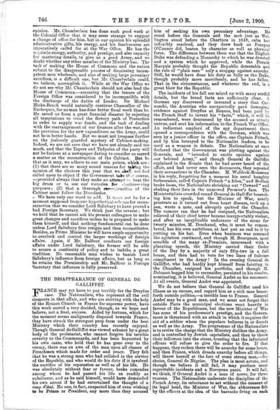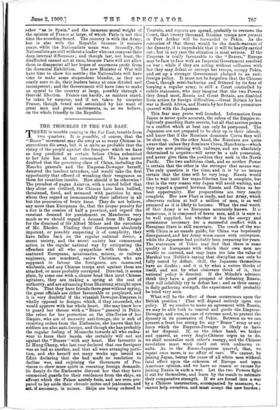THE DISAPPEARANCE OF GENERAL DE GALLIFFET.
FRANCE may yet have to pay terribly for the Dreyfus case. The Nationalists, who represent all the evil elements in that affair, and who are striving with the help of the Roman Church in France for supreme power, have this week scored a very decided, though, as we hope and believe, not a final, success. Aided by fortune, which for the moment seems malignantly disposed towards France, they have struck the strongest prop from under the best Ministry which their country has recently enjoyed. Though General de Galliffet was viewed askance by a great body of the proletariat, who cannot forgive his terrible severity to the Cornmunards, and has been boycotted by his own caste, who hold that he has gone over to the enemy, there was an awe of the man upon all classes of Frenchmen which made for order and peace. They felt that he was a strong man who had enlisted in the service of the Republic, and who would do his duty if it involved the sacrifice of his reputation as well as of his life. He was absolutely without fear or favour, broke comrades among whom he had passed his life as readily as subalterns, and as he said himself, would have demanded his own arrest if he had entertained the thought of a coup d'etat. No one, in fact, suspected him of even wishing to be Prince or President, any more than they accused him of seeking his own pecuniary advantage. He stood before the Generals and the mob just as Wel- lington stood before the Chartists in 1848, calm but inflexibly resolved, and they drew back as Feargus O'Connor did, beaten by character as well as physical force, The difference between them was that the English Duke was defending a Monarchy to which he was devoted and a system which he approved, while the French Marquis probably thought the Republic detestable and the rule of "plain men" only a stopgap against anarchy. Still, he would have done his duty as fully as the Duke, though probably more mercilessly, and he has fallen. That in the circumstances, and whatever the end, is a great blow for the Republic.
The incidents of his fall are mixed up with many sordid details, but the broad facts are sufficiently clear. A German spy discovered or invented a story that Cer- nuschi, the Austrian who unexpectedly gave damaging evidence against Dreyfus at Rennes, had been paid br the French Staff to invent his "facts," which, it will he remembered, were denounced by the accused as utterly untrue, and sent his information to the French War Office. An indiscreet employe of the spy department there opened a correspondence with the German, which was seen by a junior officer in the office, one Captain Fritsch, and by him betrayed to the Nationalist leaders, to be used as a weapon in debate. The Nationalists at once declared that the Government was plotting against the Generale, and "intended to excite opinion against our beloved Army," and though General de Galliffet explained in the Senate that he had never heard of the affair, and had never seen the documents, they repeated their accusations in the Chamber. M. Waldeck-Rousseau in his reply, forgetting for a moment his usual haughty forbearance, called Captain Fritsch "a felon," and Bedlam broke loose, the Nationalists shrieking out "Coward" and shaking their fists in the unmoved Premier's face. The Ministerialists crowded round General de Galliffet beseech- ing him to speak, but the Minister of War, nearly prostrate as it turned out from heart disease, took up a pen, wrote a note, and abruptly quitted the Chamber. The rumour ran that he had resigned, the Nationalists relieved of their chief terror became insupportably violent, and after an inexplicable endurance of the scene for twenty minutes, M. Deschanel, who, it must be remem- bered, has his own ambitions, at last put an end to it by putting on his hat. Even when business was resumed the agitation continued, and though M. Bourgeois, most sensible of the many ex-Premiers, intervened with a placating speech, the Ministry carried their Order of the Day by a majority of only fifty-two in a full house, and then had to vote for two lines of fulsome compliment to the Army ! In the evening General de Galliffet, who had hardly kept himself from fainting in the Chamber, resigned his portfolio, and though M. Delcasse begged him to reconsider, persisted in his resolve, nominating, it is believed, General Andre as his successor. At all events, General Andre was appointed.
We do not believe that General de Galliffet used his illness as an excuse, and regard him as a sick man hence- forth outside politics,—a terrible loss to France. General Andre may be a, good man, and we must not forget that outside Paris the municipal elections went heavily in favour of the Republicans, but the new Minister of War has none of his predecessor's prestige, and the Govern- ment is threatened with an attack in which it requires the aid of a soldier whom the populace believes in or dreads as well as the Army. The programme of the Nationalists is to revive the charge that the Ministry dislikes the Army, and is controlled by Jewish capitalists, and then to throw their followers into the street, trusting that the infuriated officers will refuse to give the order to fire. If that happens, they reckon there will be anarchy for some hours, and then France, which dreads anarchy before all things, will throw herself at the feet of some strong man,—for choice, General de Negrier. The plan is most astute, and though we believe it will fail, it may produce most regrettable incidents and a European panic. It will fail, we think, if General Andre is a man of nerve, for three reasons. The Nationalists underrate the discipline of the French Army, its reluctance to act without the consent of its legal head, the Minister of War, the abhorrence felt by the officers at the idea of the barracks firing on each other "as in Spain," and the immense moral weight of the opinion of France at large, of which Paris is not this time the sounding-board. The country is with the Army, but is also with the Republic because it ensures peace, while the Nationalists mean war. Secondly, the Nationalists are still without a leader who can compose their deep internal differences ; and though last, not least, the disaffected cannot act at once, because Paris will not allow them to disappoint all her hopes of enormous profit from the decenniaLExhibition. The new Minister of War will have time to show his mettle ; the Nationalists will have time to make some stupendous blunder, as they are nearly sure to do, their leaders being at once divided and incompetent ; and the Government will have time to make an appeal to the country at large, possibly through a General Election. France can hardly, as matters stand, be taken by surprise, and if not taken by surprise France, though vexed and astonished by her want of great men and great excitements, is, as we believe, on the whole friendly to the Republic.



































 Previous page
Previous page